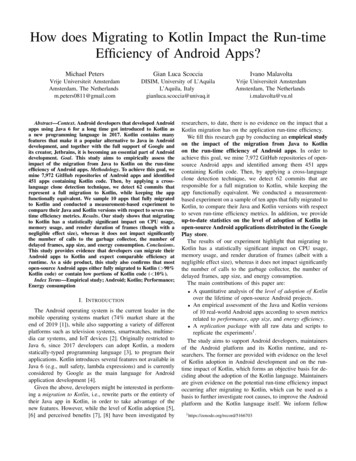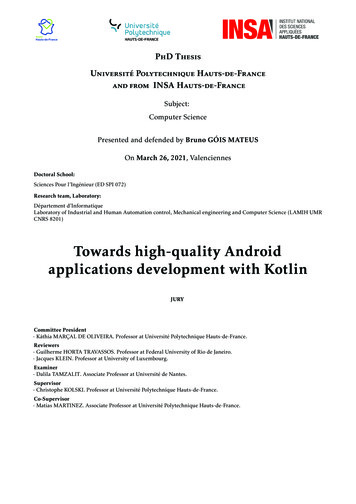
Transcription
KotlinKotlinNotes for Professionals Notes for Professionals80 pagesof professional hints and tricksGoalKicker.comFree Programming BooksDisclaimerThis is an uno cial free book created for educational purposes and isnot a liated with o cial Kotlin group(s) or company(s).All trademarks and registered trademarks arethe property of their respective owners
ContentsAbout . 1Chapter 1: Getting started with Kotlin . 2Section 1.1: Hello World . 2Section 1.2: Hello World using a Companion Object . 2Section 1.3: Hello World using an Object Declaration . 3Section 1.4: Main methods using varargs . 4Section 1.5: Compile and Run Kotlin Code in Command Line . 4Section 1.6: Reading input from Command Line . 4Chapter 2: Basics of Kotlin . 6Section 2.1: Basic examples . 6Chapter 3: Strings . 7Section 3.1: String Equality . 7Section 3.2: String Literals . 7Section 3.3: Elements of String . 8Section 3.4: String Templates . 8Chapter 4: Arrays . 9Section 4.1: Generic Arrays . 9Section 4.2: Arrays of Primitives . 9Section 4.3: Create an array . 9Section 4.4: Create an array using a closure . 9Section 4.5: Create an uninitialized array . 9Section 4.6: Extensions . 10Section 4.7: Iterate Array . 10Chapter 5: Collections . 11Section 5.1: Using list . 11Section 5.2: Using map . 11Section 5.3: Using set . 11Chapter 6: Enum . 12Section 6.1: Initialization . 12Section 6.2: Functions and Properties in enums . 12Section 6.3: Simple enum . 12Section 6.4: Mutability . 12Chapter 7: Functions . 14Section 7.1: Function References . 14Section 7.2: Basic Functions . 15Section 7.3: Inline Functions . 16Section 7.4: Lambda Functions . 16Section 7.5: Operator functions . 16Section 7.6: Functions Taking Other Functions . 17Section 7.7: Shorthand Functions . 17Chapter 8: Vararg Parameters in Functions . 18Section 8.1: Basics: Using the vararg keyword . 18Section 8.2: Spread Operator: Passing arrays into vararg functions . 18Chapter 9: Conditional Statements . 19Section 9.1: When-statement argument matching . 19Section 9.2: When-statement as expression . 19
Section 9.3: Standard if-statement . 19Section 9.4: If-statement as an expression . 19Section 9.5: When-statement instead of if-else-if chains . 20Section 9.6: When-statement with enums . 20Chapter 10: Loops in Kotlin . 22Section 10.1: Looping over iterables . 22Section 10.2: Repeat an action x times . 22Section 10.3: Break and continue . 22Section 10.4: Iterating over a Map in kotlin . 23Section 10.5: Recursion . 23Section 10.6: While Loops . 23Section 10.7: Functional constructs for iteration . 23Chapter 11: Ranges . 25Section 11.1: Integral Type Ranges . 25Section 11.2: downTo() function . 25Section 11.3: step() function . 25Section 11.4: until function . 25Chapter 12: Regex . 26Section 12.1: Idioms for Regex Matching in When Expression . 26Section 12.2: Introduction to regular expressions in Kotlin . 27Chapter 13: Basic Lambdas . 30Section 13.1: Lambda as parameter to filter function . 30Section 13.2: Lambda for benchmarking a function call . 30Section 13.3: Lambda passed as a variable . 30Chapter 14: Null Safety . 31Section 14.1: Smart casts . 31Section 14.2: Assertion . 31Section 14.3: Eliminate nulls from an Iterable and array . 31Section 14.4: Null Coalescing / Elvis Operator . 31Section 14.5: Nullable and Non-Nullable types . 32Section 14.6: Elvis Operator (?:) . 32Section 14.7: Safe call operator . 32Chapter 15: Class Delegation . 34Section 15.1: Delegate a method to another class . 34Chapter 16: Class Inheritance . 35Section 16.1: Basics: the 'open' keyword . 35Section 16.2: Inheriting fields from a class . 35Section 16.3: Inheriting methods from a class . 36Section 16.4: Overriding properties and methods . 36Chapter 17: Visibility Modifiers . 38Section 17.1: Code Sample . 38Chapter 18: Generics . 39Section 18.1: Declaration-site variance . 39Section 18.2: Use-site variance . 39Chapter 19: Interfaces . 41Section 19.1: Interface with default implementations . 41Section 19.2: Properties in Interfaces . 42Section 19.3: super keyword . 42Section 19.4: Basic Interface . 42
Section 19.5: Conflicts when Implementing Multiple Interfaces with Default Implementations . 43Chapter 20: Singleton objects . 44Section 20.1: Use as replacement of static methods/fields of java . 44Section 20.2: Use as a singleton . 44Chapter 21: coroutines . 45Section 21.1: Simple coroutine which delay's 1 second but not blocks . 45Chapter 22: Annotations . 46Section 22.1: Meta-annotations . 46Section 22.2: Declaring an annotation . 46Chapter 23: Type aliases . 47Section 23.1: Function type . 47Section 23.2: Generic type . 47Chapter 24: Type-Safe Builders . 48Section 24.1: Type-safe tree structure builder . 48Chapter 25: Delegated properties . 49Section 25.1: Observable properties . 49Section 25.2: Custom delegation . 49Section 25.3: Lazy initialization . 49Section 25.4: Map-backed properties . 49Section 25.5: Delegate Can be used as a layer to reduce boilerplate . 49Chapter 26: Reflection . 51Section 26.1: Referencing a class . 51Section 26.2: Inter-operating with Java reflection . 51Section 26.3: Referencing a function . 51Section 26.4: Getting values of all properties of a class . 51Section 26.5: Setting values of all properties of a class . 52Chapter 27: Extension Methods . 54Section 27.1: Potential Pitfall: Extensions are Resolved Statically . 54Section 27.2: Top-Level Extensions . 54Section 27.3: Lazy extension property workaround . 54Section 27.4: Sample extending Java 7 Path class . 55Section 27.5: Sample extending long to render a human readable string . 55Section 27.6: Sample extending Java 8 Temporal classes to render an ISO formatted string . 55Section 27.7: Using extension functions to improve readability . 55Section 27.8: Extension functions to Companion Objects (appearance of Static functions) . 56Section 27.9: Extensions for easier reference View from code . 57Chapter 28: DSL Building . 58Section 28.1: Infix approach to build DSL . 58Section 28.2: Using operators with lambdas . 58Section 28.3: Overriding invoke method to build DSL . 58Section 28.4: Using extensions with lambdas . 58Chapter 29: Idioms . 60Section 29.1: Serializable and serialVersionUid in Kotlin . 60Section 29.2: Delegate to a class without providing it in the public constructor . 60Section 29.3: Use let or also to simplify working with nullable objects . 61Section 29.4: Use apply to initialize objects or to achieve method chaining . 61Section 29.5: Fluent methods in Kotlin . 61Section 29.6: Filtering a list . 62Section 29.7: Creating DTOs (POJOs/POCOs) . 62
Chapter 30: RecyclerView in Kotlin . 63Section 30.1: Main class and Adapter . 63Chapter 31: logging in kotlin . 65Section 31.1: kotlin.logging . 65Chapter 32: Exceptions . 66Section 32.1: Catching exception with try-catch-finally . 66Chapter 33: JUnit . 67Section 33.1: Rules . 67Chapter 34: Kotlin Android Extensions . 68Section 34.1: Using Views . 68Section 34.2: Configuration . 68Section 34.3: Painful listener for getting notice, when the view is completely drawn now is so simple andawesome with Kotlin's extension . 69Section 34.4: Product flavors . 69Chapter 35: Kotlin for Java Developers . 71Section 35.1: Declaring Variables . 71Section 35.2: Quick Facts . 71Section 35.3: Equality & Identity . 71Section 35.4: IF, TRY and others are expressions, not statements . 72Chapter 36: Java 8 Stream Equivalents . 73Section 36.1: Accumulate names in a List . 73Section 36.2: Collect example #5 - find people of legal age, output formatted string . 73Section 36.3: Collect example #6 - group people by age, print age and names together . 73Section 36.4: Di erent Kinds of Streams #7 - lazily iterate Doubles, map to Int, map to String, print each. 74Section 36.5: Counting items in a list after filter is applied . 75Section 36.6: Convert elements to strings and concatenate them, separated by commas . 75Section 36.7: Compute sum of salaries of employee . 75Section 36.8: Group employees by department . 75Section 36.9: Compute sum of salaries by department . 75Section 36.10: Partition students into passing and failing . 75Section 36.11: Names of male members . 76Section 36.12: Group names of members in roster by gender . 76Section 36.13: Filter a list to another list . 76Section 36.14: Finding shortest string a list . 76Section 36.15: Di erent Kinds of Streams #2 - lazily using first item if exists . 76Section 36.16: Di erent Kinds of Streams #3 - iterate a range of Integers . 77Section 36.17: Di erent Kinds of Streams #4 - iterate an array, map the values, calculate the average. 77Section 36.18: Di erent Kinds of Streams #5 - lazily iterate a list of strings, map the values, convert to Int,find max . 77Section 36.19: Di erent Kinds of Streams #6 - lazily iterate a stream of Ints, map the values, print results. 77Section 36.20: How streams work - filter, upper case, then sort a list . 78Section 36.21: Di erent Kinds of Streams #1 - eager using first item if it exists . 78Section 36.22: Collect example #7a - Map names, join together with del
Free Programming Books Disclaimer This is an uno cial free book created for educational purposes and is not a liated with o cial Kotlin group(s) or company(s). All trademarks and registered trademarks a










